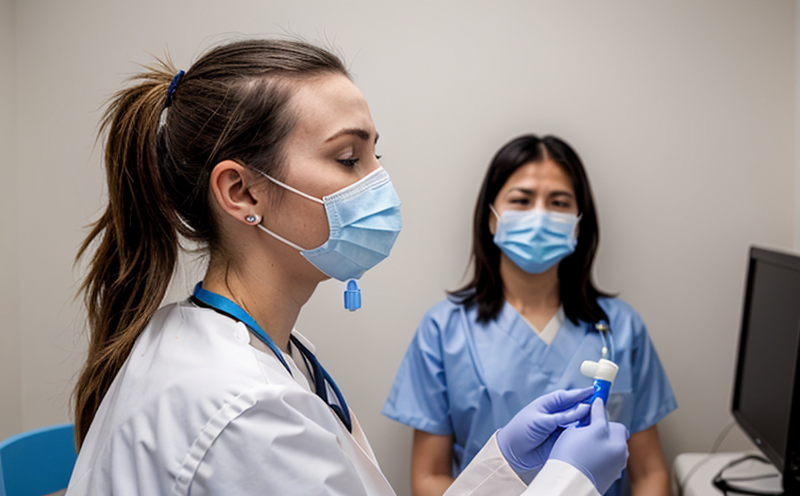Indoor Air Quality Testing for Respiratory Pathogens
The air we breathe in our homes and workplaces plays a significant role in our overall health. For those suffering from respiratory diseases, exposure to pollutants and pathogens can exacerbate symptoms and lead to severe complications. Indoor Air Quality (IAQ) testing specifically targets the presence of pathogens that could be detrimental to respiratory health.
Our laboratory offers comprehensive testing services for IAQ focusing on identifying pathogens such as bacteria, fungi, viruses, and other airborne contaminants. This service is particularly crucial in environments like schools, hospitals, nursing homes, and office buildings where high occupancy rates or poor ventilation systems can increase the risk of pathogen transmission.
The process involves collecting air samples using advanced sampling devices that capture particles down to submicron sizes. These samples are then analyzed through a variety of methods including culture-based techniques, molecular diagnostics (such as PCR), and other advanced microbiological assays. The analytical approach ensures accurate identification and quantification of pathogens present in the sampled environment.
Our team uses international standards like ISO 14698 for aerosol sampling and ISO 20743 for air quality testing to ensure our methods are robust, reliable, and consistent with global best practices. Compliance officers can rely on these tests to verify adherence to regulatory requirements set by organizations such as the World Health Organization (WHO) or national health authorities.
For researchers in R&D departments, our IAQ testing service provides valuable data for developing new products that enhance air purification technologies or improve indoor ventilation systems. Procurement teams benefit from this information when evaluating suppliers of HVAC equipment and other related services to ensure they meet stringent hygiene standards.
The importance of accurate IAQ testing cannot be overstated, especially given the rising incidence of respiratory illnesses worldwide. By identifying potential hazards early on, stakeholders can take proactive measures to mitigate risks, thereby protecting vulnerable populations such as children, elderly individuals, or those with pre-existing conditions.
Why It Matters
The quality of indoor air directly impacts the health and well-being of occupants. Poor IAQ has been linked to various respiratory issues including asthma attacks, bronchitis, sinus infections, and other lung diseases. In healthcare settings, maintaining clean air is essential not only for patient recovery but also for preventing cross-infections among patients.
For educational institutions, ensuring good indoor air quality helps create a safer learning environment where students can concentrate better without worrying about airborne pathogens affecting their breathing or causing allergic reactions. Similarly, offices benefit from improved productivity and reduced absenteeism when employees work in healthier environments.
- Enhanced Workplace Safety: By detecting harmful microorganisms early, employers demonstrate their commitment to employee welfare and safety.
- Better Educational Outcomes: Cleaner air supports better cognitive function among students leading to improved academic performance.
- Economic Savings: Reduced healthcare costs associated with respiratory illnesses translate into significant savings for both public health systems and private businesses.
In summary, investing in IAQ testing is an investment in public health. It contributes significantly towards creating safer spaces where everyone can breathe easily knowing they are protected from harmful pathogens.
Environmental and Sustainability Contributions
Beyond just safeguarding human health, effective IAQ management also plays a critical role in promoting environmental sustainability. By identifying sources of pollution and addressing them promptly, we reduce the need for additional resource-intensive interventions later on.
For instance, if our tests reveal high levels of mold spores due to insufficient moisture control within buildings, remediation efforts can focus on fixing leaks or improving ventilation rather than resorting to harsh chemical treatments. This approach aligns perfectly with sustainable practices aimed at minimizing waste and protecting natural resources.
Incorporating IAQ testing into regular maintenance routines allows facilities managers to track improvements over time. Over several years of consistent monitoring, they may observe reductions in energy consumption needed for heating or cooling processes as a result of better air filtration systems installed based on our recommendations. Such actions contribute positively towards reducing carbon footprints associated with building operations.
Moreover, by fostering healthier indoor environments through effective IAQ management, we encourage greater biodiversity outside the building itself. Cleaner outdoor air results from lower emissions inside, contributing to overall ecosystem health and resilience against climate change impacts.
Competitive Advantage and Market Impact
Our expertise in providing precise IAQ testing for respiratory pathogens provides significant competitive advantages over competitors who may not offer comparable services. Here are some key points highlighting our market impact:
- Differentiation through Precision: Utilizing cutting-edge technology allows us to deliver highly accurate results, setting a benchmark that others struggle to match.
- Comprehensive Coverage: Offering a wide range of tests covering diverse pathogens ensures comprehensive protection across different sectors.
- Regulatory Compliance Support: With deep knowledge of relevant standards and regulations, we assist clients in meeting stringent compliance requirements efficiently.
- Rapid Turnaround Times: Efficient processing speeds help businesses maintain operations without unnecessary disruptions caused by prolonged testing cycles.
- Sustainable Solutions: By integrating sustainability into our practices, we demonstrate a commitment to long-term environmental stewardship which resonates well with increasingly eco-conscious consumers and stakeholders.
These factors collectively contribute to building strong relationships with clients across various industries, enhancing brand reputation while driving business growth. Our continuous innovation ensures that we remain at the forefront of this rapidly evolving field, delivering value-added services that exceed expectations.





